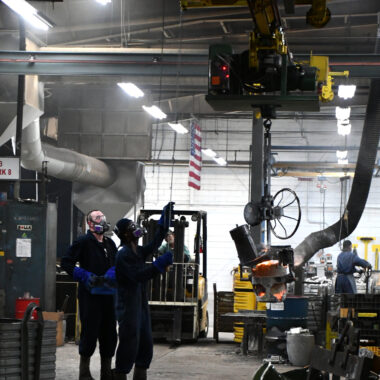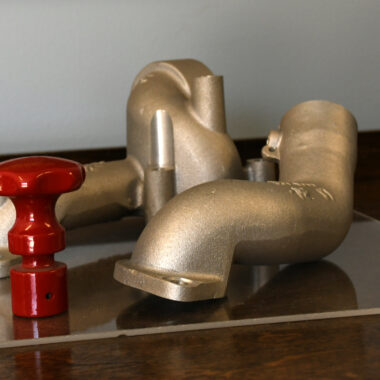About Aluminum Casting Chronicles: Methods, Trends, and Tips
Wiki Article
Crafting Perfection: How to Achieve High-Quality Light Weight Aluminum Castings Whenever
In the world of light weight aluminum spreading, the pursuit of excellence is a constant journey that needs a precise technique and a keen understanding of the details included. Accomplishing constant high-quality light weight aluminum castings requires an extensive understanding of the processes, from choosing the appropriate alloy to implementing specific mold and mildew styles and diligently controlling casting parameters. The true proficiency exists in the ability to carry out these elements flawlessly to develop flawless castings every time. As we discover the ins and outs of crafting excellence in aluminum castings, revealing the crucial techniques and strategies that bring about impeccable results ends up being critical for those striving for quality in this specific area.Comprehending Aluminum Spreading Procedures
Aluminum casting procedures, necessary in the production industry, involve the intricate transformation of molten aluminum into strong kinds through a series of carefully controlled actions. Comprehending these processes is paramount to attaining high-quality light weight aluminum castings regularly - about aluminum casting. The key approaches made use of in aluminum casting are pass away spreading, sand spreading, and financial investment spreading
Each of these processes has its benefits and is selected based on variables like complexity, volume, and desired surface of the light weight aluminum spreading. about aluminum casting. Recognizing the intricacies of these techniques is crucial for makers intending to generate premium aluminum castings regularly
Selecting the Right Aluminum Alloy
Choosing the suitable light weight aluminum alloy is an essential choice in the production of premium light weight aluminum spreadings. The selection of alloy substantially influences the homes and features of the end product. Different light weight aluminum alloys offer differing levels of toughness, deterioration resistance, machinability, and thermal conductivity. When choosing a light weight aluminum alloy for casting, it is necessary to consider the certain needs of the application to ensure optimum efficiency.One of one of the most typically utilized aluminum alloys for casting is A356. This alloy provides exceptional castability, high toughness, and excellent corrosion resistance, making it ideal for a variety of applications. 6061 light weight aluminum alloy is favored for its superior weldability and excellent mechanical homes. For applications calling for high stamina, 7075 aluminum alloy is a popular option because of its outstanding strength-to-weight ratio.
In enhancement to mechanical properties, factors to consider such as cost, availability, and post-casting procedures must additionally influence the option of the best light weight aluminum alloy. By carefully assessing these variables, makers can make certain the production of top from this source notch aluminum castings that meet the wanted specifications.
Applying Appropriate Mold And Mildew Layout
Establishing a reliable mold and mildew layout is critical for guaranteeing the effective manufacturing of top notch aluminum castings. Proper mold and mildew style plays a substantial role in attaining the wanted characteristics of the end product. To apply a successful mold design, variables such as product circulation, cooling down rates, and component geometry should be very carefully considered.One key facet of mold layout is guaranteeing correct filling and solidification of the light weight aluminum within the mold tooth cavity. This involves designing runner and gating systems that promote smooth steel flow and avoid issues such as air entrapment or incomplete filling. Furthermore, integrating air conditioning channels right into the mold layout aids manage solidification prices and decrease the danger of porosity or shrinking flaws.

Controlling Casting Parameters

Ensuring Post-Casting High Quality Checks
To preserve the premium quality of aluminum spreadings, comprehensive post-casting quality checks are important. After the casting procedure is completed, it is essential to make certain that the final items satisfy the wanted specs and criteria. Among the key top quality checks includes evaluating the surface area coating of the castings to identify any type of problems such as porosity, splits, or surface area abnormalities. This aesthetic examination is usually supplemented by non-destructive screening approaches like ultrasonic testing or dye penetrant inspection to detect inner flaws that may jeopardize the honesty of the casting. important sourceDimensional precision is one more critical element that has to be confirmed throughout post-casting high quality checks. Measurements of key measurements and tolerances must be taken to confirm that the castings adapt to the needed specifications. In addition, mechanical residential or commercial properties such as hardness, tensile stamina, and effect resistance might need to be assessed through material screening to guarantee that the spreadings possess the needed toughness and durability for their intended application.
Conclusion
Finally, accomplishing premium aluminum castings calls for a thorough understanding of the spreading processes, picking the proper alloy, making mold and mildews effectively, controlling spreading criteria diligently, and carrying out post-casting high quality checks diligently. By following these steps, manufacturers can regularly produce aluminum spreadings that meet the highest requirements of quality and efficiency.Attaining constant high-quality aluminum spreadings requires an extensive understanding of the procedures, from choosing the suitable alloy to implementing precise mold and mildew styles and diligently controlling spreading parameters. The key approaches utilized in aluminum casting are die spreading, sand spreading, and financial investment casting.
Investment spreading, likewise understood as accuracy spreading, includes developing wax patterns that are covered in ceramic to form molds.Selecting the appropriate light weight aluminum alloy is a critical decision in the production of top quality aluminum castings.Making sure precise control over spreading specifications is important for keeping uniformity and high quality in aluminum casting manufacturing.
Report this wiki page